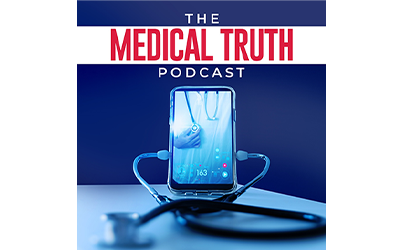In a world full of healthcare complexities and the pursuit of well-being, uncovering the underlying genetic truths behind various health issues becomes a compelling quest. In this episode of the Medical Truth Podcast, hosted by James Egidio, we explore a revolutionary approach to understanding the human body’s intricate balance – genetic testing. Join us as we dive into an insightful interview with Dr. J Dunn, a chiropractor, and kinesiologist, who has devoted her life to exploring genetic testing and supplementation, shedding light on the fascinating world of personalized health optimization.
As the episode kicks off, James Egidio introduces his guest, Dr. J Dunn, and sets the stage for a deep dive into the concept of genetic testing and its potential impact on health. Dr. J introduces “My Happy Genes,” a DNA testing platform she developed. This platform delves into genetic variations and their effects on various aspects of an individual’s health, including mood, neurotransmitter function, and even susceptibility to addiction.
Dr. J Dunn’s journey into the realm of genetic testing was driven by personal experiences. She recounts her struggle with depression and the journey to understanding that it might have genetic roots. With an intriguing blend of expertise in chiropractic care, kinesiology, and functional medicine, she began exploring how genetic variations could influence everything from mood regulation to energy production.
The core of Dr. J’s work lies in decoding an individual’s genetic blueprint. She explains that genetic variations are essentially deviations from the standard genetic code that dictate how the body functions. This can impact everything from the ability to digest certain foods to the production of vital neurotransmitters like serotonin and dopamine.
A significant revelation from genetic testing lies in tailoring an individual’s diet to their genetic makeup. Dr. J emphasizes that specific genes can determine an individual’s response to various foods, such as caffeine, alcohol, or even gluten. By identifying these genetic traits, she’s able to craft dietary recommendations that can optimize energy levels, metabolism, and overall well-being.
One of the most groundbreaking applications of genetic testing lies in the realm of addiction. Dr. J shares powerful stories of individuals who overcame their struggles with substances like methamphetamine and cocaine through a combination of genetic insights and personalized supplementation. By understanding an individual’s genetic predisposition to addiction and imbalances in neurotransmitter pathways, it’s possible to create targeted supplement regimens that mitigate cravings and promote healthier neural function.
The conversation delves into the critical role of dopamine – the “feel-good” neurotransmitter – in the brain’s reward system. Dr. J explains how addictions, whether substance-related or behavioral, are often driven by a desire to trigger dopamine release. By addressing genetic variations that impact dopamine production and reception, it becomes possible to rewire the brain’s reward response, making it more resilient against addictive behaviors.
Dr. Dunn passionately emphasizes the importance of personalized approaches when it comes to managing our health, especially regarding neurotransmitters like dopamine and serotonin. Drawing attention to the power of genetic testing, Dr. Dunn suggests that a comprehensive genetic analysis can provide a unique perspective on an individual’s genetic makeup. Unlike generalized recommendations, these analyses consider the intricate interactions between various genes, offering personalized insights into one’s health patterns.
One of the key takeaways from the interview is the concept of methylation – a pivotal process that influences various biochemical pathways within the body. Dr. Dunn masterfully explains how methyl groups play a significant role in DNA repair, gene expression, and detoxification processes. These insights are critical in understanding how different genes impact our overall health and susceptibility to various conditions.
Dr. Dunn goes on to describe the complexity of methylation and its role in influencing traits such as allergies and susceptibility to environmental factors, even highlighting how it relates to vaccine responses. The conversation underscores the significance of individual methylation patterns and how understanding them can guide healthcare decisions.
As the conversation unfolds, Dr. Dunn discusses the integration of genetic testing and personalized supplementation plans. This is where the uniqueness of each individual truly shines. The interview introduces the concept of targeted nutrition, highlighting the power of understanding one’s genetics in prescribing specific supplements. This tailored approach can address deficiencies, balance biochemical pathways, and even alleviate symptoms related to conditions such as allergies or addiction.
The interview also touches upon the potential risks and benefits of supplementation, particularly when it comes to interacting with existing medications or health conditions. Dr. Dunn emphasizes the importance of medical oversight to ensure safe and effective supplement integration, especially for those dealing with complex health issues.
In contrast to conventional DNA testing services that focus primarily on ancestry, the interview discusses the limitations of such approaches. Dr. Dunn highlights the difference between general DNA testing, which examines around 15,000 genes, and comprehensive genetic analysis, which explores around 675,000 genes. This distinction emphasizes the depth and accuracy that personalized genetic testing can provide, leading to more informed and targeted health decisions.
In a world where data privacy is a growing concern, the interview addresses the crucial matter of safeguarding sensitive genetic information. Dr. Dunn elucidates the steps taken to protect patient privacy and ensure data security. With a commitment to ethical and responsible use of genetic data, Dr. Dunn’s approach ensures that individuals can access invaluable insights without compromising their privacy.
As the conversation concludes, listeners are left with a deeper appreciation for the intersection of genetics, health, and personalized wellness. Dr. Dunn’s insights encourage us to embrace our genetic uniqueness, empowering us to make informed choices that resonate with our individual health needs. With genetic testing paving the way for targeted interventions and a deeper understanding of our bodies, the future of health looks more personalized and promising than ever before.







